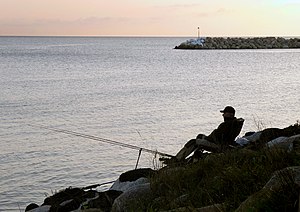
Back صيد ترفيهي Arabic Спортен риболов Bulgarian Pesca esportiva Catalan Rybaření Czech Lystfiskeri Danish Ιχθυοτουρισμός Greek Fiŝhokado EO Pesca deportiva Spanish Kalasport ET Aisialdiko arrantza EU

Recreational fishing, also called sport fishing or game fishing, is fishing for leisure, exercise or competition. It can be contrasted with commercial fishing, which is professional fishing for profit; or subsistence fishing, which is fishing for survival and livelihood.
The most common form of recreational fishing is angling, which is done with a rig of rod, reel, line, hooks and any one of a wide range of baits, as well as other complementary devices such as weights, floats, swivels and method feeders, collectively referred to as terminal tackles. Lures are frequently used instead of fresh bait when fishing for predatory fishes. Some hobbyists hand-make custom tackles themselves, including plastic lures and artificial flies.
Other forms of recreational fishing include spearfishing, which is done with a speargun or harpoon usually while diving; and bowfishing, which is done from above the water with archery equipments such as a compound bow or crossbow. Noodling and trout tickling are recreational fishing activities that uses hands to catch fish. There are also fishing techniques that uses nets, traps and other unconventional tools such as snag hook, sledgehammer and even boomerang, although inhumane or destructive fishing practices are generally discouraged and some are outright banned in most countries.
Popular fish species pursued by recreational fishermen are collectively known as game fishes. Big-game fishing, which targets large open-water fishes such as tuna, billfishes (marlins and swordfish), grouper and shark, is typically conducted from yachts, although some are also done from the shore by casting far into the waves. Although the caught fish can be consumed as food, catch and release is often encouraged for conservation purposes.